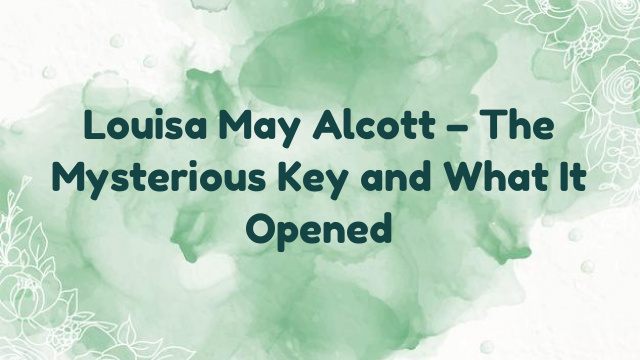
Louisa May Alcott – The Mysterious Key and What It Opened
Chapter V
Four years had passed, and Lillian was fast blooming into a lovely woman: proud and willful as ever, but very charming, and already a belle in the little world where she still reigned a queen. Owing to her mother’s ill health, she was allowed more freedom than is usually permitted to an English girl of her age; and, during the season, often went into company with a friend of Lady Trevlyn’s who was chaperoning two young daughters of her own. To the world Lillian seemed a gay, free-hearted girl; and no one, not even her mother, knew how well she remembered and how much she missed the lost Paul. No tidings of him had ever come, and no trace of him was found after his flight. Nothing was missed, he went without his wages, and no reason could be divined for his departure except the foreign letter. Bedford remembered it, but forgot what postmark it bore, for he had only been able to decipher “Italy.” My lady made many inquiries and often spoke of him; but when month after month passed and no news came, she gave him up, and on Lillian’s account feigned to forget him. Contrary to Hester’s fear, she did not seem the worse for the nocturnal fright, but evidently connected the strange visitor with Paul, or, after a day or two of nervous exhaustion, returned to her usual state of health. Hester had her own misgivings, but, being forbidden to allude to the subject, she held her peace, after emphatically declaring that Paul would yet appear to set her mind at rest.
“Lillian, Lillian, I’ve such news for you! Come and hear a charming little romance, and prepare to see the hero of it!” cried Maud Churchill, rushing into her friend’s pretty boudoir one day in the height of the season.
Lillian lay on a couch, rather languid after a ball, and listlessly begged Maud to tell her story, for she was dying to be amused.
“Well my, dear, just listen and you’ll be as enthusiastic as I am,” cried Maud. And throwing her bonnet on one chair, her parasol on another, and her gloves anywhere, she settled herself on the couch and began: “You remember reading in the papers, some time ago, that fine account of the young man who took part in the Italian revolution and did that heroic thing with the bombshell?”
“Yes, what of him?” asked Lillian, sitting up.
“He is my hero, and we are to see him tonight.”
“Go on, go on! Tell all, and tell it quickly,” she cried.
“You know the officers were sitting somewhere, holding a council, while the city (I forget the name) was being bombarded, and how a shell came into the midst of them, how they sat paralyzed, expecting it to burst, and how this young man caught it up and ran out with it, risking his own life to save theirs?”
“Yes, yes, I remember!” And Lillian’s listless face kindled at the recollection.
“Well, an Englishman who was there was so charmed by the act that, finding the young man was poor and an orphan, he adopted him. Mr. Talbot was old, and lonely, and rich, and when he died, a year after, he left his name and fortune to this Paolo.”
“I’m glad, I’m glad!” cried Lillian, clapping her hands with a joyful face. “How romantic and charming it is!”
“Isn’t it? But, my dear creature, the most romantic part is to come. Young Talbot served in the war, and then came to England to take possession of his property. It’s somewhere down in Kent, a fine place and good income, all his; and he deserves it. Mamma heard a deal about him from Mrs. Langdon, who knew old Talbot and has seen the young man. Of course all the girls are wild to behold him, for he is very handsome and accomplished, and a gentleman by birth. But the dreadful part is that he is already betrothed to a lovely Greek girl, who came over at the same time, and is living in London with a companion; quite elegantly, Mrs. Langdon says, for she called and was charmed. This girl has been seen by some of our gentlemen friends, and they already rave about the ‘fair Helene,’ for that’s her name.”
Here Maud was forced to stop for breath, and Lillian had a chance to question her.
“How old is she?”
“About eighteen or nineteen, they say.”
“Very pretty?”
“Ravishing, regularly Greek and divine, Fred Raleigh says.”
“When is she to be married?”
“Don’t know; when Talbot gets settled, I fancy.”
“And he? Is he as charming as she?”
“Quite, I’m told. He’s just of age, and is, in appearance as in everything else, a hero of romance.”
“How came your mother to secure him for tonight?”
“Mrs. Langdon is dying to make a lion of him, and begged to bring him. He is very indifferent on such things and seems intent on his own affairs. Is grave and old for his years, and doesn’t seem to care much for pleasure and admiration, as most men would after a youth like his, for he has had a hard time, I believe. For a wonder, he consented to come when Mrs. Langdon asked him, and I flew off at once to tell you and secure you for tonight.”
“A thousand thanks. I meant to rest, for Mamma frets about my being so gay; but she won’t object to a quiet evening with you. What shall we wear?” And here the conversation branched off on the all-absorbing topic of dress.
When Lillian joined her friend that evening, the hero had already arrived, and, stepping into a recess, she waited to catch a glimpse of him. Maud was called away, and she was alone when the crowd about the inner room thinned and permitted young Talbot to be seen. Well for Lillian that no one observed her at that moment, for she grew pale and sank into a chair, exclaiming below her breath, “It is Paul—my Paul!”
She recognized him instantly, in spite of increased height, a dark moustache, and martial bearing. It was Paul, older, graver, handsomer, but still “her Paul,” as she called him, with a flush of pride and delight as she watched him, and felt that of all there she knew him best and loved him most. For the childish affection still existed, and this discovery added a tinge of romance that made it doubly dangerous as well as doubly pleasant.
Will he know me? she thought, glancing at a mirror which reflected a slender figure with bright hair, white arms, and brilliant eyes; a graceful little head, proudly carried, and a sweet mouth, just then very charming, as it smiled till pearly teeth shone between the ruddy lips.
I’m glad I’m not ugly, and I hope he’ll like me, she thought, as she smoothed the golden ripples on her forehead, settled her sash, and shook out the folds of her airy dress in a flutter of girlish excitement. “I’ll pretend not to know him, when we meet, and see what he will do,” she said, with a wicked sense of power; for being forewarned she was forearmed, and, fearing no betrayal of surprise on her own part, was eager to enjoy any of which he might be guilty.
Leaving her nook, she joined a group of young friends and held herself prepared for the meeting. Presently she saw Maud and Mrs. Langdon approaching, evidently intent on presenting the hero to the heiress.
“Mr. Talbot, Miss Trevlyn,” said the lady. And looking up with a well-assumed air of indifference, Lillian returned the gentleman’s bow with her eyes fixed full upon his face.
Not a feature of that face changed, and so severely unconscious of any recognition was it that the girl was bewildered. For a moment she fancied she had been mistaken in his identity, and a pang of disappointment troubled her; but as he moved a chair for Maud, she saw on the one ungloved hand a little scar which she remembered well, for he received it in saving her from a dangerous fall. At the sight all the happy past rose before her, and if her telltale eyes had not been averted they would have betrayed her. A sudden flush of maidenly shame dyed her cheek as she remembered that last ride, and the childish confidences then interchanged. This Helen was the little sweetheart whose picture he wore, and now, in spite of all obstacles, he had won both fortune and ladylove. The sound of his voice recalled her thoughts, and glancing up she met the deep eyes fixed on her with the same steady look they used to wear. He had addressed her, but what he said she knew not, beyond a vague idea that it was some slight allusion to the music going on in the next room. With a smile which would serve for an answer to almost any remark, she hastily plunged into conversation with a composure that did her credit in the eyes of her friends, who stood in awe of the young hero, for all were but just out.
“Mr. Talbot hardly needs an introduction here, for his name is well-known among us, though this is perhaps his first visit to England?” she said, flattering herself that this artful speech would entrap him into the reply she wanted.
With a slight frown, as if the allusion to his adventure rather annoyed him, and a smile that puzzled all but Lillian, he answered very simply, “It is not my first visit to this hospitable island. I was here a few years ago, for a short time, and left with regret.”
“Then you have old friends here?” And Lillian watched him as she spoke.
“I had. They had doubtless forgotten me now,” he said, with a sudden shadow marring the tranquillity of his face.
“Why doubt them? If they were true friends, they will not forget.”
The words were uttered impulsively, almost warmly, but Talbot made no response, except a polite inclination and an abrupt change in the conversation.
“That remains to be proved. Do you sing, Miss Trevlyn?”
“A little.” And Lillian’s tone was both cold and proud.
“A great deal, and very charmingly,” added Maud, who took pride in her friend’s gifts both of voice and beauty. “Come, dear, there are so few of us you will sing, I know. Mamma desired me to ask you when Edith had done.”
To her surprise Lillian complied, and allowed Talbot to lead her to the instrument. Still hoping to win some sign of recognition from him, the girl chose an air he taught her and sang it with a spirit and skill that surprised the listeners who possessed no key to her mood. At the last verse her voice suddenly faltered, but Talbot took up the song and carried her safely through it with his well-tuned voice.
“You know the air then?” she said in a low tone, as a hum of commendation followed the music.
“All Italians sing it, though few do it like yourself,” he answered quietly, restoring the fan he had held while standing beside her.
Provoking boy! why won’t he know me? thought Lillian. And her tone was almost petulant as she refused to sing again.
Talbot offered his arm and led her to a seat, behind which stood a little statuette of a child holding a fawn by a daisy chain.
“Pretty, isn’t it?” she said, as he paused to look at it instead of taking the chair before her. “I used to enjoy modeling tiny deer and hinds in wax, as well as making daisy chains. Is sculpture among the many accomplishments which rumor tells us you possess?”
“No. Those who, like me, have their own fortunes to mold find time for little else,” he answered gravely, still examining the marble group.
Lillian broke her fan with an angry flirt, for she was tired of her trial, and wished she had openly greeted him at the beginning; feeling now how pleasant it would have been to sit chatting of old times, while her friends dared hardly address him at all. She was on the point of calling him by his former name, when the remembrance of what he had been arrested the words on her lips. He was proud; would he not dread to have it known that, in his days of adversity, he had been a servant? For if she betrayed her knowledge of his past, she would be forced to tell where and how that knowledge was gained. No, better wait till they met alone, she thought; he would thank her for her delicacy, and she could easily explain her motive. He evidently wished to seem a stranger, for once she caught a gleam of the old, mirthful mischief in his eye, as she glanced up unexpectedly. He did remember her, she was sure, yet was trying her, perhaps, as she tried him. Well, she would stand the test and enjoy the joke by-and-by. With this fancy in her head she assumed a gracious air and chatted away in her most charming style, feeling both gay and excited, so anxious was she to please, and so glad to recover her early friend. A naughty whim seized her as her eye fell on a portfolio of classical engravings which someone had left in disorder on a table near her. Tossing them over she asked his opinion of several, and then handed him one in which Helen of Troy was represented as giving her hand to the irresistible Paris.
“Do you think her worth so much bloodshed, and deserving so much praise?” she asked, vainly trying to conceal the significant smile that would break loose on her lips and sparkle in her eyes.
Talbot laughed the short, boyish laugh so familiar to her ears, as he glanced from the picture to the arch questioner, and answered in a tone that made her heart beat with a nameless pain and pleasure, so full of suppressed ardor was it:
“Yes! ‘All for love or the world well lost’ is a saying I heartily agree to. La belle Helene is my favorite heroine, and I regard Paris as the most enviable of men.”
“I should like to see her.”
The wish broke from Lillian involuntarily, and she was too much confused to turn it off by any general expression of interest in the classical lady.
“You may sometime,” answered Talbot, with an air of amusement; adding, as if to relieve her, “I have a poetical belief that all the lovely women of history or romance will meet, and know, and love each other in some charming hereafter.”
“But I’m no heroine and no beauty, so I shall never enter your poetical paradise,” said Lillian, with a pretty affectation of regret.
“Some women are beauties without knowing it, and the heroines of romances never given to the world. I think you and Helen will yet meet, Miss Trevlyn.”
As he spoke, Mrs. Langdon beckoned, and he left her pondering over his last words, and conscious of a secret satisfaction in his implied promise that she should see his betrothed.
“How do you like him?” whispered Maud, slipping into the empty chair.
“Very well,” was the composed reply; for Lillian enjoyed her little mystery too much to spoil it yet.
“What did you say to him? I longed to hear, for you seemed to enjoy yourselves very much, but I didn’t like to be a marplot.”
Lillian repeated a part of the conversation, and Maud professed to be consumed with jealousy at the impression her friend had evidently made.
“It is folly to try to win the hero, for he is already won, you know,” answered Lillian, shutting the cover on the pictured Helen with a sudden motion as if glad to extinguish her.
“Oh dear, no; Mrs. Langdon just told Mamma that she was mistaken about their being engaged; for she asked him and he shook his head, saying Helen was his ward.”
“But that is absurd, for he’s only a boy himself. It’s very odd, isn’t it? Never mind, I shall soon know all about it.”
“How?” cried Maud, amazed at Lillian’s assured manner.
“Wait a day or two and, I’ll tell you a romance in return for yours. Your mother beckons to me, so I know Hester has come. Good night. I’ve had a charming time.”
And with this tantalizing adieu, Lillian slipped away. Hester was waiting in the carriage, but as Lillian appeared, Talbot put aside the footman and handed her in, saying very low, in the well-remembered tone:
“Good night, my little mistress.”
Chapter VI
To no one but her mother and Hester did Lillian confide the discovery she had made. None of the former servants but old Bedford remained with them, and till Paul chose to renew the old friendship it was best to remain silent. Great was the surprise and delight of our lady and Hester at the good fortune of their protege, and many the conjectures as to how he would explain his hasty flight.
“You will go and see him, won’t you, Mamma, or at least inquire about him?” said Lillian, eager to assure the wanderer of a welcome, for those few words of his had satisfied her entirely.
“No, dear, it is for him to seek us, and till he does, I shall make no sign. He knows where we are, and if he chooses he can renew the acquaintance so strangely broken off. Be patient, and above all things remember, Lillian, that you are no longer a child,” replied my lady, rather disturbed by her daughter’s enthusiastic praises of Paul.
“I wish I was, for then I might act as I feel, and not be afraid of shocking the proprieties.” And Lillian went to bed to dream of her hero.
For three days she stayed at home, expecting Paul, but he did not come, and she went out for her usual ride in the Park, hoping to meet him. An elderly groom now rode behind her, and she surveyed him with extreme disgust, as she remembered the handsome lad who had once filled that place. Nowhere did Paul appear, but in the Ladies’ Mile she passed an elegant brougham in which sat a very lovely girl and a mild old lady.
“That is Talbot’s fiancee,” said Maud Churchill, who had joined her. “Isn’t she beautiful?”
“Not at all—yes, very,” was Lillian’s somewhat peculiar reply, for jealousy and truth had a conflict just then. “He’s so perfectly absorbed and devoted that I am sure that story is true, so adieu to our hopes,” laughed Maud.
“Did you have any? Good-bye, I must go.” And Lillian rode home at a pace which caused the stout groom great distress.
“Mamma, I’ve seen Paul’s betrothed!” she cried, running into her mother’s boudoir.
“And I have seen Paul himself,” replied my lady, with a warning look, for there he stood, with half-extended hand, as if waiting to be acknowledged.
Lillian forgot her embarrassment in her pleasure, and made him an elaborate curtsy, saying, with a half-merry, half-reproachful glance, “Mr. Talbot is welcome in whatever guise he appears.”
“I choose to appear as Paul, then, and offer you a seat, Miss Lillian,” he said, assuming as much of his boyish manner as he could.
Lillian took it and tried to feel at ease, but the difference between the lad she remembered and the man she now saw was too great to be forgotten.
“Now tell us your adventures, and why you vanished away so mysteriously four years ago,” she said, with a touch of the childish imperiousness in her voice, though her frank eyes fell before his.
“I was about to do so when you appeared with news concerning my cousin,” he began.
“Your cousin!” exclaimed Lillian.
“Yes, Helen’s mother and my own were sisters. Both married Englishmen, both died young, leaving us to care for each other. We were like a brother and sister, and always together till I left her to serve Colonel Daventry. The death of the old priest to whom I entrusted her recalled me to Genoa, for I was then her only guardian. I meant to have taken leave of you, my lady, properly, but the consequences of that foolish trick of mine frightened me away in the most unmannerly fashion.”
“Ah, it was you, then, in the state chamber; I always thought so,” and Lady Trevlyn drew a long breath of relief.
“Yes, I heard it whispered among the servants that the room was haunted, and I felt a wish to prove the truth of the story and my own courage. Hester locked me in, for fear of my sleepwalking; but I lowered myself by a rope and then climbed in at the closet window of the state chamber. When you came, my lady, I thought it was Hester, and slipped into the bed, meaning to give her a fright in return for her turning the key on me. But when your cry showed me what I had done, I was filled with remorse, and escaped as quickly and quietly as possible. I should have asked pardon before; I do now, most humbly, my lady, for it was sacrilege to play pranks there.”
During the first part of his story Paul’s manner had been frank and composed, but in telling the latter part, his demeanor underwent a curious change. He fixed his eyes on the ground and spoke as if repeating a lesson, while his color varied, and a half-proud, half-submissive expression replaced the former candid one. Lillian observed this, and it disturbed her, but my lady took it for shame at his boyish freak and received his confession kindly, granting a free pardon and expressing sincere pleasure at his amended fortunes. As he listened, Lillian saw him clench his hand hard and knit his brows, assuming the grim look she had often seen, as if trying to steel himself against some importunate emotion or rebellious thought.
“Yes, half my work is done, and I have a home, thanks to my generous benefactor, and I hope to enjoy it well and wisely,” he said in a grave tone, as if the fortune had not yet brought him his heart’s desire.
“And when is the other half of the work to be accomplished, Paul? That depends on your cousin, perhaps.” And Lady Trevlyn regarded him with a gleam of womanly curiosity in her melancholy eyes.
“It does, but not in the way you fancy, my lady. Whatever Helen may be, she is not my fiancee yet, Miss Lillian.” And the shadow lifted as he laughed, looking at the young lady, who was decidedly abashed, in spite of a sense of relief caused by his words.
“I merely accepted the world’s report,” she said, affecting a nonchalant air.
“The world is a liar, as you will find in time” was his abrupt reply.
“I hope to see this beautiful cousin, Paul. Will she receive us as old friends of yours?”
“Thanks, not yet, my lady. She is still too much a stranger here to enjoy new faces, even kind ones. I have promised perfect rest and freedom for a tune, but you shall be the first whom she receives.”
Again Lillian detected the secret disquiet which possessed him, and her curiosity was roused. It piqued her that this Helen felt no desire to meet her and chose to seclude herself, as if regardless of the interest and admiration she excited. “I will see her in spite of her refusal, for I only caught a glimpse in the Park. Something is wrong, and I’ll discover it, for it evidently worries Paul, and perhaps I can help him.”
As this purpose sprang up in the warm but willful heart of the girl, she regained her spirits and was her most charming self while the young man stayed. They talked of many things in a pleasant, confidential manner, though when Lillian recalled that hour, she was surprised to find how little Paul had really told them of his past life or future plans. It was agreed among them to say nothing of their former relations, except to old Bedford, who was discretion itself, but to appear to the world as new-made friends—thus avoiding unpleasant and unnecessary explanations which would only excite gossip. My lady asked him to dine, but he had business out of town and declined, taking his leave with a lingering look, which made Lillian steal away to study her face in the mirror and wonder if she looked her best, for in Paul’s eyes she had read undisguised admiration.
Lady Trevlyn went to her room to rest, leaving the girl free to ride, drive, or amuse herself as she liked. As if fearing her courage would fail if she delayed, Lillian ordered the carriage, and, bidding Hester mount guard over her, she drove away to St. John’s Wood.
“Now, Hester, don’t lecture or be prim when I tell you that we are going on a frolic,” she began, after getting the old woman into an amiable mood by every winning wile she could devise. “I think you’ll like it, and if it’s found out I’ll take the blame. There is some mystery about Paul’s cousin, and I’m going to find it out.”
“Bless you, child, how?”
“She lives alone here, is seldom seen, and won’t go anywhere or receive anyone. That’s not natural in a pretty girl. Paul won’t talk about her, and, though he’s fond of her, he always looks grave and grim when I ask questions. That’s provoking, and I won’t hear it. Maud is engaged to Raleigh, you know; well, he confided to her that he and a friend had found out where Helen was, had gone to the next villa, which is empty, and under pretense of looking at it got a peep at the girl in her garden. I’m going to do the same.”
“And what am I to do?” asked Hester, secretly relishing the prank, for she was dying with curiosity to behold Paul’s cousin.
“You are to do the talking with the old woman, and give me a chance to look. Now say you will, and I’ll behave myself like an angel in return.”
Hester yielded, after a few discreet scruples, and when they reached Laburnum Lodge played her part so well that Lillian soon managed to stray away into one of the upper rooms which overlooked the neighboring garden. Helen was there, and with eager eyes the girl scrutinized her. She was very beautiful, in the classical style; as fair and finely molded as a statue, with magnificent dark hair and eyes, and possessed of that perfect grace which is as effective as beauty. She was alone, and when first seen was bending over a flower which she caressed and seemed to examine with great interest as she stood a long time motionless before it. Then she began to pace slowly around and around the little grass plot, her hands hanging loosely clasped before her, and her eyes fixed on vacancy as if absorbed in thought. But as the first effect of her beauty passed away, Lillian found something peculiar about her. It was not the somewhat foreign dress and ornaments she wore; it was in her face, her movements, and the tone of her voice, for as she walked she sang a low, monotonous song, as if unconsciously. Lillian watched her keenly, marking the aimless motions of the little hands, the apathy of the lovely face, and the mirthless accent of the voice; but most of all the vacant fixture of the great dark eyes. Around and around she went, with an elastic step and a mechanical regularity wearisome to witness.
What is the matter with her? thought Lillian anxiously, as this painful impression increased with every scrutiny of the unconscious girl. So abashed was she that Hester’s call was unheard, and Hester was unseen as she came and stood beside her. Both looked a moment, and as they looked an old lady came from the house and led Helen in, still murmuring her monotonous song and moving her hands as if to catch and hold the sunshine.
“Poor dear, poor dear. No wonder Paul turns sad and won’t talk of her, and that she don’t see anyone,” sighed Hester pitifully.
“What is it? I see, but don’t understand,” whispered Lillian.
“She’s an innocent, deary, an idiot, though that’s a hard word for a pretty creature like her.”
“How terrible! Come away, Hester, and never breathe to anyone what we have seen.” And with a shudder and sense of pain and pity lying heavy at her heart, she hurried away, feeling doubly guilty in the discovery of this affliction. The thought of it haunted her continually; the memory of the lonely girl gave her no peace; and a consciousness of deceit burdened her unspeakably, especially in Paul’s presence. This lasted for a week, then Lillian resolved to confess, hoping that when he found she knew the truth he would let her share his cross and help to lighten it. Waiting her opportunity, she seized a moment when her mother was absent, and with her usual frankness spoke out impetuously.
“Paul, I’ve done wrong, and I can have no peace till I am pardoned. I have seen Helen.”
“Where, when, and how?” he asked, looking disturbed and yet relieved.
She told him rapidly, and as she ended she looked up at him with her sweet face, so full of pity, shame, and grief it would have been impossible to deny her anything.
“Can you forgive me for discovering this affliction?”
“I think I could forgive you a far greater fault, Lillian,” he answered, in a tone that said many things.
“But deceit is so mean, so dishonorable and contemptible, how can you so easily pardon it in me?” she asked, quite overcome by this forgiveness, granted without any reproach.
“Then you would find it hard to pardon such a thing in another?” he said, with the expression that always puzzled her.
“Yes, it would be hard; but in those I loved, I could forgive much for love’s sake.”
With a sudden gesture he took her hand saying, impulsively, “How little changed you are! Do you remember that last ride of ours nearly five years ago?”
“Yes, Paul,” she answered, with averted eyes.
“And what we talked of?”
“A part of that childish gossip I remember well.”
“Which part?”
“The pretty little romance you told me.” And Lillian looked up now, longing to ask if Helen’s childhood had been blighted like her youth.
Paul dropped her hand as if he, read her thoughts, and his own hand went involuntarily toward his breast, betraying that the locket still hung there.
“What did I say?” he asked, smiling at her sudden shyness.
“You vowed you’d win and wed your fair little lady-love if you lived.”
“And so I will,” he cried, with sudden fire in his eyes.
“What, marry her?”
“Aye, that I will.”
“Oh Paul, will you tie yourself for life to a—” The word died on her lips, but a gesture of repugnance finished the speech.
“A what?” he demanded, excitedly.
“An innocent, one bereft of reason,” stammered Lillian, entirely forgetting herself in her interest for him.
“Of whom do you speak?” asked Paul, looking utterly bewildered,
“Of poor Helen.”
“Good heavens, who told you that base lie?” And his voice deepened with indignant pain.
“I saw her, you did not deny her affliction; Hester said so, and I believed it. Have I wronged her, Paul?”
“Yes, cruelly. She is blind, but no idiot, thank God.”
There was such earnestness in his voice, such reproach in his words, and such ardor in his eye, that Lillian’s pride gave way, and with a broken entreaty for pardon, she covered up her face, weeping the bitterest tears she ever shed. For in that moment, and the sharp pang it brought her, she felt how much she loved Paul and how hard it was to lose him. The childish affection had blossomed into a woman’s passion, and in a few short weeks had passed through many phases of jealousy, hope, despair, and self-delusion. The joy she felt on seeing him again, the pride she took in him, the disgust Helen caused her, the relief she had not dared to own even to herself, when she fancied fate had put an insurmountable barrier between Paul and his cousin, the despair at finding it only a fancy, and the anguish of hearing him declare his unshaken purpose to marry his first love—all these conflicting emotions had led to this hard moment, and now self-control deserted her in her need. In spite of her efforts the passionate tears would have their way, though Paul soothed her with assurances of entire forgiveness, promises of Helen’s friendship, and every gentle device he could imagine. She commanded herself at last by a strong effort, murmuring eagerly as she shrank from the hand that put back her fallen hair, and the face so full of tender sympathy bending over her:
“I am so grieved and ashamed at what I have said and done. I shall never dare to see Helen. Forgive me, and forget this folly. I’m sad and heavyhearted just now; it’s the anniversary of Papa’s death, and Mamma always suffers so much at such times that I get nervous.”
“It is your birthday also. I remembered it, and ventured to bring a little token in return for the one you gave me long ago. This is a talisman, and tomorrow I will tell you the legend concerning it. Wear it for my sake, and God bless you, dear.”
The last words were whispered hurriedly; Lillian saw the glitter of an antique ring, felt the touch of bearded lips on her hand, and Paul was gone.
But as he left the house he set his teeth, exclaiming low to himself, “Yes, tomorrow there shall be an end of this! We must risk everything and abide the consequences now. I’ll have no more torment for any of us.”




